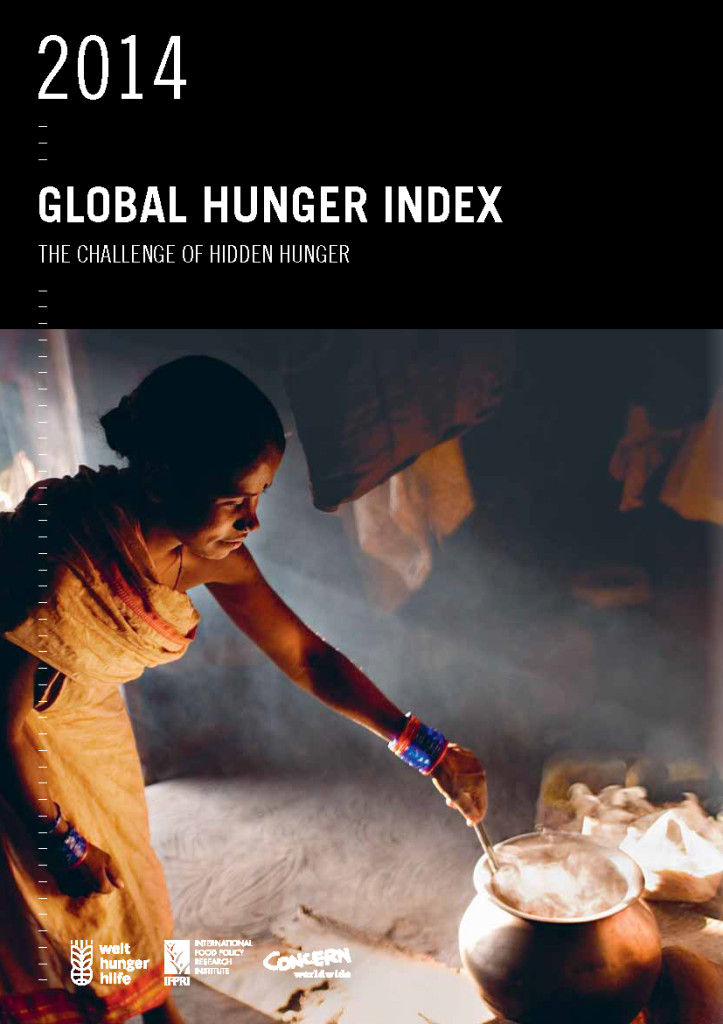 Two billion people suffering from hidden hunger according to 2014 Global Hunger Index, even as levels of hunger in many developing countries decrease
Two billion people suffering from hidden hunger according to 2014 Global Hunger Index, even as levels of hunger in many developing countries decrease
Report says food quality is equally important as quantity
October 13, 2014, Washington D.C.—A staggering 2 billion people get so little essential vitamins and minerals from the foods they eat that they remain undernourished, according to the 2014 Global Hunger Index (GHI) being released today by the International Food Policy Research Institute, Welthungerhilfe, and Concern Worldwide.
This “hidden hunger”—the focus of the report’s main essay—is often hard to detect, but is potentially devastating. Hidden hunger weakens the immune system, stunts physical and intellectual growth, and can lead to death. It wreaks economic havoc as well, locking countries into cycles of poor nutrition, lost productivity, poverty, and reduced economic growth.
The 2014 GHI examines levels of hunger in 120 developing countries and countries in transition and scores them based on three equally weighted indicators: the proportion of people who are undernourished, the proportion of children under five who are underweight, and the mortality rate of children under five.
While great strides have been made to feed the world, 805 million people are still chronically undernourished because they don’t get enough to eat. Yet even those who eat enough calories can suffer from hidden hunger, a critical aspect of hunger and nutrition that is often overlooked. To combat it, we need to enable the production of diverse crops and ensure the availability nutrient-rich foods, including fruits and vegetables.
“Particularly in countries facing a high burden of malnutrition, hidden hunger goes hand in hand with other forms of malnutrition and cannot be addressed in isolation,” said Welthungerhilfe president Bärbel Dieckmann. “In the long-term, people cannot break out of the vicious cycle of poverty and malnutrition without being granted the basic right to nutritious food.”
The good news in this year’s GHI is that the number of people going hungry has steadily decreased in most developing countries. Since 1990, hunger in the developing world has fallen by 39 percent, and 26 countries have reduced their scores by 50 percent or more. Angola, Bangladesh, Cambodia, Chad, Ghana, Malawi, Niger, Rwanda, Thailand, and Vietnam have seen the greatest improvements in their scores between the 1990 GHI and the 2014 GHI. The bad news is that levels of hunger are still “alarming” in 14 countries, and “extremely alarming” in two, Burundi and Eritrea.
This year’s GHI includes provisional data from India on underweight in children under five, for the first time in eight years. Improvements in this index indicator show the prevalence of underweight in children fell by almost 13 percent between 2005–2006 and 2013–2014, contributing to India’s movement in the Index from the “alarming” category to the “serious.” Due to its sheer size, gains in India helped South Asia improve its 2014 GHI score: Levels of hunger in the region have fallen by 41 percent since 1990.
“We are excited to see that there are improvements in India and also globally,” said Shenggen Fan, IFPRI’s director general. “The GHI shows that hunger has been decreasing since 1990, but there is much more to be done to address hunger—including hidden hunger—to ensure food and nutrition security for the most vulnerable.”
Hidden hunger affects not only the well-being of the individual. It also carries economic costs, cutting gross domestic product in many developing countries. Yet the benefits of action can be great: Research on the effects of salt iodization suggests that every dollar invested in iodization generates up to $81 in benefits.
“The great news is that we have clear evidence proving that investing in nutrition is one of the smartest development investments we can make,” said Dominic MacSorley, CEO of Concern Worldwide. “What is needed now is more practical action on the ground, such as our RAIN project in Zambia included in this year’s GHI report, and more political action at the international level to end all forms of malnutrition.”
Preventing and treating hidden hunger requires action at all levels. The global community must ensure that the post-2015 framework includes a universal goal to end hunger and malnutrition in all its forms and clear mechanisms to ensure accountability.

The International Food Policy Research Institute (IFPRI) seeks sustainable solutions for ending hunger and poverty. IFPRI was established in 1975 to identify and analyze alternative national and international strategies and policies for meeting the food needs of the developing world, with particular emphasis on low-income countries and on the poorer groups in those countries. It is a member of the CGIAR Consortium. www.ifpri.org
Welthungerhilfe is one of the largest non-governmental aid organizations in Germany. It provides fully integrated aid from one source, ranging from rapid emergency relief to reconstruction programs, as well as long-term development projects with local partner organizations following the principle of help toward self-help. In addition, we aim at changing the conditions that lead to hunger and poverty by awareness raising and advocacy work at national and international level. In 2013, Welthungerhilfe supported vulnerable populations in 40 countries with 355 overseas projects, striving for a world without hunger or poverty. For further information, visit www.welthungerhilfe.de
Founded in Ireland in 1968, Concern Worldwide is a non-governmental, international, humanitarian organization, dedicated to the reduction of suffering and working toward the ultimate elimination of extreme poverty. The mission is to help people living in extreme poverty to achieve major improvements in their lives which last and spread without ongoing support from Concern. To achieve this mission Concern engages in long term development work, responds to emergency situations, and seeks to address the root causes of poverty through development education and advocacy work. Concern currently works in 27 of the world’s poorest countries, with offices in London, New York, Belfast and Dublin and more than 2,900 committed and talented staff. The public can receive regular updates online through the Concern website, www.concern.net
